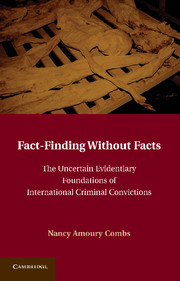 Fact-Finding without Facts
Fact-Finding without Facts Book contents
- Frontmatter
- Contents
- Acknowledgments
- Introduction
- 1 The Evidence Supporting International Criminal Convictions
- 2 Questions Unanswered: International Witnesses and the Information Unconveyed
- 3 The Educational, Linguistic, and Cultural Impediments to Accurate Fact-Finding at the International Tribunals
- 4 Of Inconsistencies and Their Explanations
- 5 Perjury: The Counternarrative
- 6 Expectations Unfulfilled: The Consequences of the Fact-Finding Impediments
- 7 Casual Indifference: The Trial Chambers' Treatment of Testimonial Deficiencies
- 8 Organizational Liability Revived: The Pro-Conviction Bias Explained
- 9 Help Needed: Practical Suggestions and Procedural Reforms to Improve Fact-Finding Accuracy
- 10 Assessing the Status Quo: They Are Not Doing What They Say They Are Doing, but Is What They Are Doing Worth Doing?
- Conclusion
- Bibliography
- Index
- References
10 - Assessing the Status Quo: They Are Not Doing What They Say They Are Doing, but Is What They Are Doing Worth Doing?
Published online by Cambridge University Press: 05 October 2010
- Frontmatter
- Contents
- Acknowledgments
- Introduction
- 1 The Evidence Supporting International Criminal Convictions
- 2 Questions Unanswered: International Witnesses and the Information Unconveyed
- 3 The Educational, Linguistic, and Cultural Impediments to Accurate Fact-Finding at the International Tribunals
- 4 Of Inconsistencies and Their Explanations
- 5 Perjury: The Counternarrative
- 6 Expectations Unfulfilled: The Consequences of the Fact-Finding Impediments
- 7 Casual Indifference: The Trial Chambers' Treatment of Testimonial Deficiencies
- 8 Organizational Liability Revived: The Pro-Conviction Bias Explained
- 9 Help Needed: Practical Suggestions and Procedural Reforms to Improve Fact-Finding Accuracy
- 10 Assessing the Status Quo: They Are Not Doing What They Say They Are Doing, but Is What They Are Doing Worth Doing?
- Conclusion
- Bibliography
- Index
- References
Summary
The previous chapter considers ways of improving fact-finding accuracy at the international tribunals. The first two sections of Chapter 9 explore large and small procedural reforms to improve testimonial quality. Assuming those reforms would be insufficient to the task at hand, the final section considers, as a less desirable alternative the increased use of associational doctrines. These doctrines not only can be satisfied with less testimonial evidence, they are more easily satisfied than doctrines of direct liability by the kinds of evidence presented to the international tribunals. The goal of Chapter 9, then, is to improve fact-finding accuracy preferably by improving the quality of the evidence that fact-finders receive but, failing that, then by making more accurate, transparent use of the suboptimal evidence that fact finders receive.
This final chapter, by contrast, assumes the status quo and assesses it. That is, in this chapter, I assume that the tribunals' fact-finding deficiencies have not been ameliorated by the reforms advocated in Chapter 9, and I consider the normative implications of these deficiencies. In particular, I consider different theories by which we might justify the tribunals' current method of fact-finding. To recap, I previously asserted that in many cases Trial Chambers supplement the problematic testimony they receive with inferences that they draw from the defendants' official position or institutional affiliation in the context of the international crimes that have been committed. So, in section 10.A, I consider the adequacy of those inferences in satisfying the prosecution's burden of proof.
Information
- Type
- Chapter
- Information
- Fact-Finding without FactsThe Uncertain Evidentiary Foundations of International Criminal Convictions, pp. 334 - 364Publisher: Cambridge University PressPrint publication year: 2010